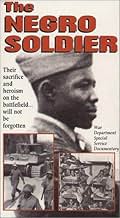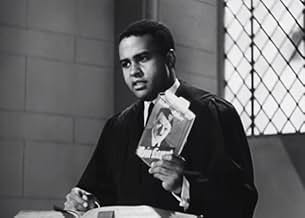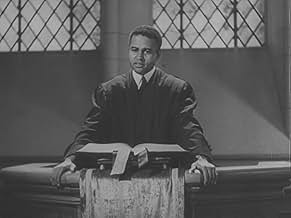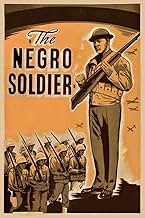Agrega una trama en tu idiomaDocumentary focusing on the contributions to the American war effort of African-American soldiers.Documentary focusing on the contributions to the American war effort of African-American soldiers.Documentary focusing on the contributions to the American war effort of African-American soldiers.
- Dirección
- Guionista
- Elenco
- Premios
- 2 premios ganados en total
Clyde Turner
- Soloist in Church
- (as Sgt. Clyde Turner)
Bertha Woolford
- Mrs. Bronson
- (as Bertha Wolford)
Norman Ford
- Lt. Robert E. Bronson
- (as Lt. Norman Ford)
Gertrude Elise Ayer
- Self - Principal
- (material de archivo)
Richmond Barthé
- Self - Sculptor
- (material de archivo)
- (as Richard Barthe)
Erich Borchmeyer
- Self
- (material de archivo)
Dean Dixon
- Self - Conductor
- (material de archivo)
W.C. Handy
- Self
- (material de archivo)
Matthew Henson
- Self - Polar Explorer
- (material de archivo)
Adolf Hitler
- Self
- (material de archivo)
Cornelius Johnson
- Self
- (material de archivo)
Henry Johnson
- Self - WW1 Soldier
- (material de archivo)
Ralph Metcalfe
- Self
- (material de archivo)
Lawrence Reddick
- Self - Museum Curator
- (material de archivo)
- Dirección
- Guionista
- Todo el elenco y el equipo
- Producción, taquilla y más en IMDbPro
Opiniones destacadas
As all "good" propaganda this also is telling the truth. Well part of it at least. Omissing crucial other things that may not serve the purpose the movie/documentary had in mind. Because this was about recruiting people of color to the military. So you know, they only tell the people the good stuff, not the things that were still dividing America. It's almost tragic, but some of the things dividing are still very apparent (especially with number 45 in power).
You may say, why go to current politics? The question should not be raised, because while there is no commentary at hand (at least not with Netflix), this is a testament to a part of history some like to forget. And how devious methods were applied to benefit an army, pretending to be more than it was ...
You may say, why go to current politics? The question should not be raised, because while there is no commentary at hand (at least not with Netflix), this is a testament to a part of history some like to forget. And how devious methods were applied to benefit an army, pretending to be more than it was ...
The Negro Soldier (1944)
** 1/2 (out of 4)
Mildly entertaining documentary from the War Department, which was made to try and get more black people to join the military. Many of these WWII documentaries were directed by people like Frank Capra and John Huston but this one here comes from Stuant Heslier who got the job at William Wyler quit the project thinking that the documentary was too fake for its own good.
If you recently viewed this film on Turner Classic Movies then you probably saw the introduction with author Mark Harris. If not, his book "Five Came Back: A Story of Hollywood and the Second World War" has some information about this film. From Harris, the War Department feared that black people weren't going to join the Army because there were reports out there that their lives might be better if the United States lost the war. When viewing this film it's obvious the see that the "truth" was being left out and especially since this film tries to make it seem like black people were "free" during 1944.
Of course, we know that a lot of hard times laid ahead but, as Harris states, it's important to remember that this film was made during wartime and the War Department needed people to join. The documentary features Joe Louis as someone doing it "right" and there's a lot of footage from the Olympics that were held in Germany where Jesse Owens shined. The film also talks about Hitler wanting to destroy black people and their freedom. There's a lot of interesting stuff going on here and the film is certainly entertaining but there's just too much missing or covered up for it to be a complete entertainment.
** 1/2 (out of 4)
Mildly entertaining documentary from the War Department, which was made to try and get more black people to join the military. Many of these WWII documentaries were directed by people like Frank Capra and John Huston but this one here comes from Stuant Heslier who got the job at William Wyler quit the project thinking that the documentary was too fake for its own good.
If you recently viewed this film on Turner Classic Movies then you probably saw the introduction with author Mark Harris. If not, his book "Five Came Back: A Story of Hollywood and the Second World War" has some information about this film. From Harris, the War Department feared that black people weren't going to join the Army because there were reports out there that their lives might be better if the United States lost the war. When viewing this film it's obvious the see that the "truth" was being left out and especially since this film tries to make it seem like black people were "free" during 1944.
Of course, we know that a lot of hard times laid ahead but, as Harris states, it's important to remember that this film was made during wartime and the War Department needed people to join. The documentary features Joe Louis as someone doing it "right" and there's a lot of footage from the Olympics that were held in Germany where Jesse Owens shined. The film also talks about Hitler wanting to destroy black people and their freedom. There's a lot of interesting stuff going on here and the film is certainly entertaining but there's just too much missing or covered up for it to be a complete entertainment.
Documentary focusing on the contributions to the American war effort of African-American soldiers.
The film was produced by Frank Capra as a follow up to his successful film series "Why We Fight". The army used this film as propaganda to convince Black Americans to enlist in the army and fight in the war. Most people regarded the film very highly, some going as far as to say that "The Negro Soldier" was "one of the finest things that ever happened to America".
In different movies during this time period, African Americans were often portrayed as humorous characters. However, after "The Negro Soldier", African Americans played more respectable and prominent roles in films. I don't know if this film is directly connected to the new way these men were shown in film. I can acknowledge there was definitely a post-war shift. And it might be as simple as saying that white men and black men fought together, making them more unified in the 1940s... but that would disregard the role that minorities had in earlier wars.
The film was produced by Frank Capra as a follow up to his successful film series "Why We Fight". The army used this film as propaganda to convince Black Americans to enlist in the army and fight in the war. Most people regarded the film very highly, some going as far as to say that "The Negro Soldier" was "one of the finest things that ever happened to America".
In different movies during this time period, African Americans were often portrayed as humorous characters. However, after "The Negro Soldier", African Americans played more respectable and prominent roles in films. I don't know if this film is directly connected to the new way these men were shown in film. I can acknowledge there was definitely a post-war shift. And it might be as simple as saying that white men and black men fought together, making them more unified in the 1940s... but that would disregard the role that minorities had in earlier wars.
The aim of the movie is to encourage American blacks to identify themselves with the on-going struggle overseas.
It is convincing but fairly dull in comparison to other Frank Capra propaganda films.
It is convincing but fairly dull in comparison to other Frank Capra propaganda films.
A US World War 2 propaganda film, showing how African-American soldiers are helping the Allied cause.
A well-made propaganda film. Quite stirring in showing the contribution African-Americans had made to previous wars and were making to the current war, World War 2. Made to convince African-Americans to join up and help win the war it does well to paper over the race-based social divide that existed in the US at the time.
Quite sad in the respect in that, while it was okay for African-Americans to fight and die for their country, they were treated as second class citizens at home, with less rights than whites. Just the fact that the film had to be made is a sad reflection of the times.
This said, it is very effective in its purpose and is even quite emotional at times. Some good military footage too.
A well-made propaganda film. Quite stirring in showing the contribution African-Americans had made to previous wars and were making to the current war, World War 2. Made to convince African-Americans to join up and help win the war it does well to paper over the race-based social divide that existed in the US at the time.
Quite sad in the respect in that, while it was okay for African-Americans to fight and die for their country, they were treated as second class citizens at home, with less rights than whites. Just the fact that the film had to be made is a sad reflection of the times.
This said, it is very effective in its purpose and is even quite emotional at times. Some good military footage too.
¿Sabías que…?
- TriviaIn 2011, the film was selected for preservation in the National Film Registry by the Library of Congress with the following statement: "'The Negro Soldier' showcased the contributions of blacks to American society and their heroism in the nation's wars, portraying them in a dignified, realistic, and far less stereotypical manner than they had been depicted in previous Hollywood films."
- Versiones alternativasAccording to government documents, a two-reel shortened version of the film was released in July 1944.
- ConexionesEdited from America (1924)
Selecciones populares
Inicia sesión para calificar y agrega a la lista de videos para obtener recomendaciones personalizadas
Detalles
Taquilla
- Presupuesto
- USD 78,254 (estimado)
- Tiempo de ejecución43 minutos
- Color
- Mezcla de sonido
- Relación de aspecto
- 1.37 : 1
Contribuir a esta página
Sugiere una edición o agrega el contenido que falta

Principales brechas de datos
By what name was The Negro Soldier (1944) officially released in Canada in English?
Responda
























